Graham Reid | | 10 min read
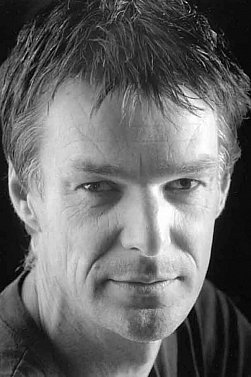
If you're a fan of MasterChef and have glossy recipe books on your shelves, then Melbourne's Wayne Macauley has a novel for you. If you despise the current overload of television cooking shows and obsession with food he's got exactly the same one.
Macauley's The Cook – which won the inaugural 2012 Most Underrated Book Award in Australia – has been hailed as a brilliant satire but is also a moving story about hope, expectation, the lure of fame and social mores.
Located between the dreams of a juvenile delinquent and a series of MasterChef, The Cook speaks through the mind of an ambitious but flawed boy Zac whose shot at redemption is in a cooking school where there are eliminations and what some might call “big personalities”. It feels sharply authentic, is poetic as Zac's thought-lines run fluidly and often without punctuation, becomes violently dark and, most of all, is astutely observed. It's that world on the small screen eating its own.
Macauley inhabits his character by adopting Zac's voice – a skill he attributes to theatre work – but trying to find a bio of the author isn't easy. His website is almost scrupulously free of such detail for someone who is billed as taking a scalpel to middle class obsessions and so on.
So Wayne, what is your background, were you one of those good middle-class boys you have sometimes skewered, or were you more of the Zac kind?
I suppose I am [middle-class] although those terms are a bit dickey. I come from what you might call aspirational working class moving by increments into the lower middle class and I'd probably call myself comfortably lower middle class. My family were not bookish or intellectual so I'm pretty much a suburban boy.
Just a kid from the suburbs?
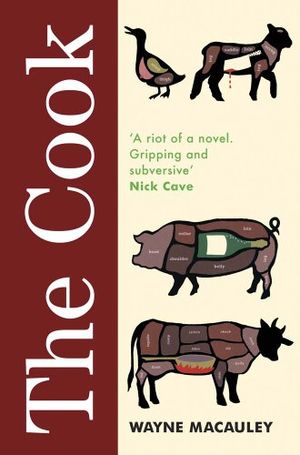 Yeah I am, a place called Mitcham in
Melbourne which, when I was growing up, sits just on the edge where
the country started. So it was quite bushy and an adventurous place
to be when I was a kid, but then it gradually filled up with houses
and is now an outer suburb, although well established. It was not an
unhappy childhood and I grew up where there was trees and creeks and
so lived a very free and happy life in that respect.
Yeah I am, a place called Mitcham in
Melbourne which, when I was growing up, sits just on the edge where
the country started. So it was quite bushy and an adventurous place
to be when I was a kid, but then it gradually filled up with houses
and is now an outer suburb, although well established. It was not an
unhappy childhood and I grew up where there was trees and creeks and
so lived a very free and happy life in that respect.
That's refreshing to hear because so many people want to prefer their childhood was rather more difficult than it actually was.
I can't say it was, although things changed in my late teens and early 20s, as it does for a lot of people and you come to the crossroads. But my childhood was game playing and adventures. I wasn't a bookish kid but was into science, experiments and nature and those kinds of things. I didn't really go near books very much. Obviously we had kids books in the house and there was an encyclopedia and an atlas.
And then there was the appalling epiphany which lead to you being a writer?
(Laughs) I think I grew into it. In my teens I'd find books would land in my lap and I vaguely remember going to my grandma's house and she had Agatha Christies and I remember reading some of them. That would be my first memory of reading a proper book, and I would have been in my teens by then. There were books you had to read at school but it wasn't until my final year of secondary school – I would have been 16 or 17 – that I chose to do English literature. That was my epiphany. I had a great teacher and some incredible books thrust at me and the sparks started to fly in my head.
When I think back now it was quite amazing what we did: Patrick White's Voss, James Joyce's Portrait of the Artist as a Young Man; Shakespeare's Hamlet, Ibsen's Brand which is a great play and Elliot's Wasteland.
That's serious stuff.
Yeah. At that age I was hungry for something else and it came at me at the right moment, and they were well-chosen books for a young man because they were about yearning and searching and what you want to be. All of those things are in that list and set of sparks for where I was at that moment.
So was that the 'bugger it, I'm not going to work in the shop. I'm going to be a writer'?
I think there was a part of that although it wasn't quite that clearly formed, more just I actually already had . . . I'd become a bit troublesome and it wasn't going anywhere but I was bucking the system. I actually left secondary school after my fifth year and said, 'Bugger you all I'm going to earn money and do great things' and then in the Christmas break couldn't find a job!
I realised I'd made a terrible mistake and actually went back to school with my tail between my legs to do my final year. I ate humble pie and that was when I walked into that literature class.
I was looking for something and had no idea what it was, and that arrived at the right time, almost presented to me on a plate and it felt right and great. Then, as we all do, I started to write some poetry.
Most of it was the usual, trying your voice out and being self-expressive. I haven't written poetry since my late teens. I gravitated to the short story in my early 20s and I'm an advocate for the short form and I've written what I would call short fiction, experimenting with voice. Some of it veers towards prose poetry and lot of my shorter prose generally has a lyrical poetic quality.
So I brought some of that poetry into my my prose, the compaction of poetry, the cleanness of the line which I got from reading Elliot in that year, and Shakespeare to a large extent too.
You mentioned 'the voice ' before and what struck me, especially reading Caravan Story and The Cook, is that you have the voice, you've found somebody else's voice. How does that happen and how do you inhabit the character?
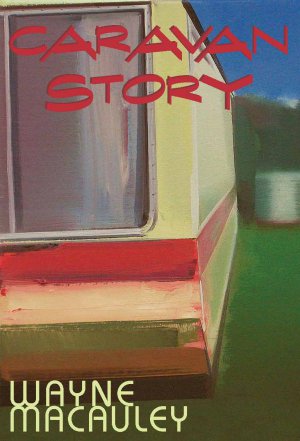 I think if I track back through my
prose, short and long, everyone is always to some extent telling, if
not a character then a persona behind, how we receive the story. I've
done that all along.
I think if I track back through my
prose, short and long, everyone is always to some extent telling, if
not a character then a persona behind, how we receive the story. I've
done that all along.
The other thing that happened in my early 20s was I had a great interest in theatre and so I spent a couple of years studying at a prestigious drama school here. So I think, and I've only understood this retrospectively, I've also brought a lot of what I learned from the performing arts into my prose and a lot of that is about taking on a character, literally learning how to do that, whether it be the Brechtian technique or the Stanislavsky technique.
The taking on of a character is what a writer does as much as an actor, so coming back to the question, I suppose that in some ways The Cook has been a long time coming because I felt I'd finally developed enough skill and craft as a writer to even dare attempt such a thing in long form. It was something iId always wanted to do, to run with a character.
You do it in Caravan Story too.
That's true, I think all of my work is being told from a particular skewed voice, a tone or a rhythm which is peculiar to that. But with The Cook I stretched even more and did draw on my theatre background where I tried to get deeply inside the character. I'd been working around that idea for years.
It came to fruition in The Cook in taking on another person's thoughts.
I love the way the lines run, punctuation-free in places and it's a surreptitious satire. I love the fact it received an award for the Most Underrated Book of 2012. That's something to brag about.
I was very happy to win that. I'd come through indie publishing and have done the long haul and that was my own personal milestone. I felt really touched by that actually because I valued the statement that award was making.
When I was reading The Cook there were lines that leaped out like “fresh ingredients, good preparation, made with love, simple flavours . . .” These are the cliches we hear from MasterChef but I was in India last week and a guy there said exactly the same thing. You saw this boy's story as a way into saying something about that.
Yes, there is a satirical thrust to a lot of my work and it's satirical because I do keep my ears and eyes open. I do like to feel I'm in touch with the zeitgeist, although the contemporary one is very slippery and fluid. I feel a commitment to deal with the world I live in and I've got my antennae up.
I'd been thinking about the cooking thing for a long time. I can't help but come from an angle of questioning and asking why this is going on. So I'd been thinking about it for a while and it is ubiquitous, it's international and in various media and weekend supplements.
So I suppose like every book in way it starts with a question – not that you expect every book to answer that question – but it does start from a curiosity. Just wondering what would be like to believe all this from the inside, what would sound like if you really believed all this crap.
But the kid is ambitious, he needs it to get out of where he's been?
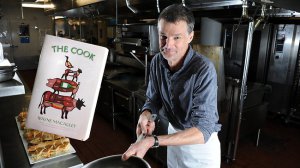 That is what all this food porn is
about because it's selling a dream like all those reality TV shows,
the idea that wherever you are on the social hierarchy it's not good
enough, there's somewhere else to be. This idea of ambition and
aspiration is actually in our culture but I can't think of a time
where it's been so powerful. It shifts a lot of glossy magazines on
the basis of aspiration like 'That could be me' or 'Look at her on
the beach and how can she be famous when she's got fat rolls like
that?'. All those kinds of issues.
That is what all this food porn is
about because it's selling a dream like all those reality TV shows,
the idea that wherever you are on the social hierarchy it's not good
enough, there's somewhere else to be. This idea of ambition and
aspiration is actually in our culture but I can't think of a time
where it's been so powerful. It shifts a lot of glossy magazines on
the basis of aspiration like 'That could be me' or 'Look at her on
the beach and how can she be famous when she's got fat rolls like
that?'. All those kinds of issues.
Every fat kid can be a Kardashian?
Yeah, and the food things is part of that. So I concentrated my energies on that. But beyond anything else it's selling us the idea that we can live a decadent life and somehow have wealth and power and privilege attached to you. It's not about food anymore.
You are speak in wriers' festivals though where your audience is looking at you thinking 'Wow, that guy's made it, he's a writer and I'm here to get the key to his success'.
You are absolutely right and the crossover has even got that far into such serious deep-thinking professions as writing. We have writers festivals and people do try to find the shortcut to this thing, but I come to all this as an outsider and for any kind of artist that's a good place to come from . . . because you see things differently.
This stuff is going on in the culture and at a political level I don't think it's right, in fact it's awful. I don't know who is pulling the strings but I think it's an awful way to keep us all down. I think that's what it really is and that's the hard edge of the book because we see at the end the cards were always stacked against Zac from the very beginning and he's been sold an enormous lie. He was in a certain level in the social hierarchy and he was never going to move very far beyond that.
I've read on your website and respect this, that you get up every day and do it again. You are disciplined.
That's what I realised very early. I heard a writer say that there's only one way to write and that's to actually write. For a while in my 20s I dreamed about being a writer but I didn't do enough writing. I see a lot of that now, a young generation of writers getting ahead of themselves and thinking they are writers before they've actually got down and done it.
I don't want to sound like an old man, but the discipline is important. No matter what you are writing – it might be the most avant-garde out-there thing or a serious work – you actually have to get up every day, or start every night whichever you prefer, and actually just do it
I know what my discipline is, what's yours?
The way my life is structure which is not a bad place to be is 6.30am to 7 at the desk, four or five hours writing. My current regime is a minimum of two pages a day and I teach a couple of afternoons a week [creative writing at the University of Melbourne] and do other things which can pull in a bit of money for me. That's where I spend my afternoons. But I'm writing a novel so it's five mornings a week, minimum four hours, weekends off.
In all seriousness I don't know how a novel comes out at the other end, but I know the best chance of it coming out is by creating that structure and disciple, by fire-walling yourself with structure and routine and going to the desk every day, maybe even year in, year out.
Did you have the big whiteboard up where you knew the long arc of your novels, or do you write and the characters reveal themselves?
Much more the latter. I have an overall plan. My plan for The Cook when I started writing – it was in my diary, I will start on this day – was I had half a dozen pages of notes and sketches but my plan was one and half A4 pages which described the book as it turned out: three parts, the first at cook school, the part in the wealthy home and the confessional part at the end.
I mapped out how many pages they would take and I wrote to that, but what happens within that very broad plan is I'm flying by the seat of my pants. I'm coming to the desk not knowing enough to keep me excited.
Given all that, when you go to bed do you dream of those characters?
No I don't. And that's what I'm saying about the weekend as well. I'm trying very hard to leave my desk and leave it behind. I down tools and do something else so I won't be tormented by my characters. So that when I wake up in the morning I'm really happy to go and meet them, no matter how horrible they might be.
If you down tools what do you do?
I have a family so you have those obligation as we get older. But I might go and teach, and I support the AFL team Richmond and I love them. I go to the footy as often as I can. Whatever it is, it's something that's not the book.
After The Cook, should I ask you for a recipe?
No, I left all that behind!


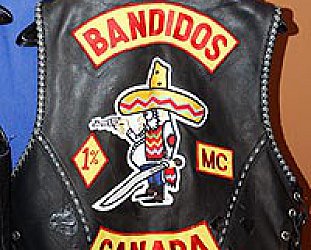

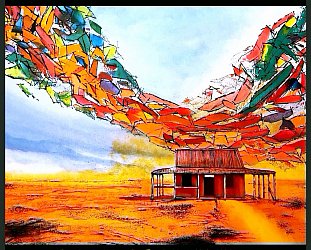
Dee - May 21, 2013
Great interview Graham, very insightful into Wayne's writing process and background, areas that his Auckland Writers & Readers talk didn't cover, or did so from different angles. I highly recommend The Cook, and can't wait to read Wayne's other work particularly his short stories.
Savepost a comment